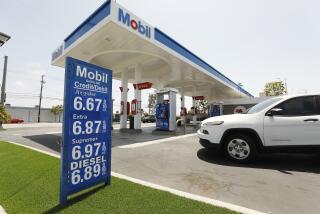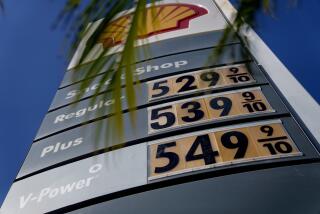Saudis Vow Freer Flow of Oil
- Share via
Saudi Arabia provided hope for a break in high worldwide oil prices Monday by pledging to step up production by 500,000 barrels a day if the current price of crude doesn’t fall swiftly and sharply.
Although the extra Saudi production probably wouldn’t be available in this country for 45 days or more, the announcement could quickly change the psychology of the energy markets. That, in turn, might bring a measure of price relief this month to motorists, factory owners and other big users of petroleum products.
The effect on California gasoline prices is likely to be small because supplies here generally come from in-state, Alaskan or Indonesian sources, said Arthur O’Donnell, editor of California Energy Markets, an independent weekly newsletter for the energy industry.
The announcement by Saudi Arabia, the world’s No. 1 oil exporter, follows a stunning run-up in prices from late last year--when analysts still were talking about a supposed surplus--to current levels approaching a nine-year high.
That rise has translated into steep increases in U.S. gasoline prices, yielding pump prices that surpassed $2 a gallon in the Midwest. It also has triggered calls for government investigations of the energy industry.
While declining to predict the effect on U.S. gasoline prices, the Clinton administration welcomed the Saudi announcement.
P.J. Crowley, the spokesman for the White House National Security Council, said that “from our standpoint, increased supplies at reasonable prices are what is right for the global marketplace.”
Asked what role the United States had played in the decision, Crowley said only that “we’ve made our position clear on the need to meet global demand for oil.”
It was feared prices in California were heading to the $2-a-gallon range back in March, but they generally eased in recent weeks. As of Monday, the statewide average price of self-serve regular was $1.71 a gallon.
O’Donnell said the promised Saudi production increase was “a symbolic gesture. It will help people’s perceptions about the oil supply.”
More upbeat was John Kilduff, senior vice president of energy risk management at Fimat USA Inc. in New York. “This is a solid commitment by the Saudis to stem prices. It should be good for an immediate 50-cent to $1-a-barrel drop.”
“If others go along,” Kilduff added, citing OPEC members Kuwait and the United Arab Emirates and nonmember Mexico, “this would signal an end to the rally, and prices could be headed below $30 a barrel.”
Another analyst predicted that gasoline prices across much of the country would fall by about a nickel a gallon within two weeks.
Not everyone was convinced, however, that the Saudis will deliver on their pledge.
“It wouldn’t be the first time someone from OPEC has announced it would do one thing and, in fact, done another,” said Joseph Tovey, a New York-based investment banker who specializes in the energy industry. “OPEC has no obligation to tell the truth.”
Other analysts expressed doubt that Saudi Arabia would carry through on such a move so soon after the June 21 decision by OPEC--short for the Organization of Petroleum Exporting Countries--to increase exports 708,000 barrels a day. The previously announced increase amounts to about 3% of the cartel’s production and not quite 1% of daily global demand of about 76 million barrels.
The new Saudi initiative, announced by Oil Minister Ali al Naimi, reflects growing anxiety about the global economic harm that could result from high prices for gasoline and other petroleum products.
Saudi Arabia, the only major oil producer with enough surplus capacity to have an effect on world markets by itself, said it would consult in coming days with other OPEC members about further hikes in output. The proposed Saudi increase would amount to a 6% rise in the country’s current production.
“We have sought, and will continue in any way we can, to bring prices down to the target level of $25 a barrel,” Naimi told the official Saudi Press Agency on Monday. “If the price does not decrease, Saudi Arabia, in conjunction with other producers, will increase production by 500,000 barrels per day within the next few days.”
There are many types of crude oil, but the benchmark West Texas intermediate was last priced at $25 a barrel in April, when the price of unleaded regular gasoline averaged $1.16 a gallon, according to AAA, the automobile association. Since then, crude oil has climbed to about $30 a barrel while gasoline, despite declines in the last two weeks, is at an average $1.625 a gallon nationally.
At their peak last month, gasoline prices topped $2 a gallon in parts of the Midwest, prompting a government investigation into allegations of price collusion among the major oil companies. The petroleum industry denies the accusations and blames supply problems for reducing inventories at a time of rising demand.
Prices also have been steep in California, where the charge for a gallon can run as much as a dime higher than in other parts of the country because of clean-burning fuel requirements. The state’s prices remain above last year’s high of $1.62 a gallon, a level reached in mid-April 1999 after a series of refinery mishaps.
In his published statement, Naimi explained his country’s position by saying that “excessive high prices could have a negative impact on the world economy, which in turn weakens demand in the long run.”
The Clinton administration has urged Saudi Arabia, Mexico and other countries to boost oil production to relieve the upward pressure on prices. O’Donnell said that lobbying apparently was what triggered the Saudi announcement.
New York markets will be closed until Wednesday because of the Independence Day holiday, but prices for crude oil are poised to drop when trading resumes today in London, analysts said. Before the announcement, London benchmark Brent crude rose 53 cents, or 1.7%, to $31.10 a barrel Monday, up 70% from a year ago.
*
Times staff writer James Gerstenzang in Washington contributed to this story. The Washington Post, Bloomberg News and Associated Press also contributed.
More to Read
Sign up for Essential California
The most important California stories and recommendations in your inbox every morning.
You may occasionally receive promotional content from the Los Angeles Times.













